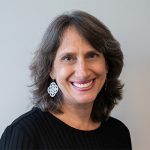 Professor Marlene Schwartz was featured in UConn Today for her role as a co-investigator on a newly funded project from the CT Department of Public Health to study how the COVID-19 pandemic has affected obesity-related dietary behaviors and weight outcomes. Read the article here.
Professor Marlene Schwartz was featured in UConn Today for her role as a co-investigator on a newly funded project from the CT Department of Public Health to study how the COVID-19 pandemic has affected obesity-related dietary behaviors and weight outcomes. Read the article here.
Faculty
Rebecca Puhl featured in Axios article
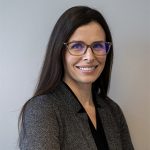 Professor Rebecca Puhl was featured in an article in Axios about weight stigma in the workplace. Read the article here.
Professor Rebecca Puhl was featured in an article in Axios about weight stigma in the workplace. Read the article here.
Marketa Burnett, HDFS Faculty Spotlight, August 2023
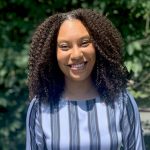 Dr. Marketa Burnett is a developmental psychologist who joined UConn as an assistant professor of HDFS and Africana Studies in August 2023. Through her work she strives to disrupt deficit-based narratives of Black girls and Black families and instead center their strengths, resilience, and resistance. Marketa is a proud native of Greensboro, North Carolina– a city rich in Black history and tradition. On February 1, 1960, the Greensboro Four sparked a nationwide sit-in movement at Woolworth’s lunch counter. Today, it is home to the International Civil Rights Center and Museum.
Dr. Marketa Burnett is a developmental psychologist who joined UConn as an assistant professor of HDFS and Africana Studies in August 2023. Through her work she strives to disrupt deficit-based narratives of Black girls and Black families and instead center their strengths, resilience, and resistance. Marketa is a proud native of Greensboro, North Carolina– a city rich in Black history and tradition. On February 1, 1960, the Greensboro Four sparked a nationwide sit-in movement at Woolworth’s lunch counter. Today, it is home to the International Civil Rights Center and Museum.
In 2017, she graduated with a bachelor’s degree in Psychology & African, African American, and Diaspora Studies from UNC Chapel Hill. She credits her time as a Ronald E. McNair scholar for introducing her to the many opportunities available to make meaningful social change through research. She would go on to complete her Ph.D. in Developmental Psychology at UNC Chapel Hill. With support from the Ford Foundation, she launched the I PERSIST Project (Identifying Predictors of Engagement, Resilience, Socialization, and Identity in STem). In this project, she interviewed both caregivers and adolescent Black girls to examine the developmental mechanisms that influence Black girls’ STEM identity and persistence over time. Marketa continued her training at the University of South Carolina as a Postdoctoral Research Fellow where she investigated how religious coping factors might shape identity development and well-being among Black families.
Currently, Marketa investigates the psychological and contextual factors that shape Black girls’ identity development and their educational trajectories. In addition, she explores the ways Black family processes (e.g., socialization) mitigate the effects of educational inequality and promote resilience and resistance among Black youth. Marketa sees her research as storytelling. She intentionally partners with Black youth and families in the co-construction of knowledge to accurately represent their stories and center their ideas and solutions.
Outside of work, Marketa enjoys watching game shows (especially Jeopardy!), buying more books than she has time to read, visiting local wineries, and trying out new recipes in the kitchen.
Kari Adamsons elected Board Member-at-Large with NCFR
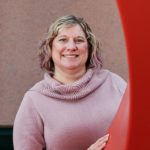 Congratulations to Associate Professor Kari Adamsons, newly elected Board Member-at-Large for the National Council on Family Relations.
Congratulations to Associate Professor Kari Adamsons, newly elected Board Member-at-Large for the National Council on Family Relations.
Kim Gans’ research highlighted in UConn Today
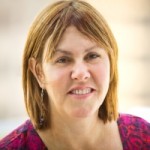 Professor Kim Gans’ new research with Meals on Wheels of Rhode Island was highlighted in UConn today. Read the article here.
Professor Kim Gans’ new research with Meals on Wheels of Rhode Island was highlighted in UConn today. Read the article here.
Kim Gans receives 2023 InCHIP Exellence Award
 Professor Kim Gans received the 2023 InCHIP Community-Engaged Health Research Excellence Award. This award recognizes a faculty member who has demonstrated excellence in health-related research conducted in collaboration with one or more community organizations and consistent with the mission of InCHIP. Congratulations Kim!
Professor Kim Gans received the 2023 InCHIP Community-Engaged Health Research Excellence Award. This award recognizes a faculty member who has demonstrated excellence in health-related research conducted in collaboration with one or more community organizations and consistent with the mission of InCHIP. Congratulations Kim!
Ronald Rohner, 2023 recipient of Jean Lau Chin Award from APA
 Emeritus Professor Ronald Rohner is the 2023 recipient of the Jean Lau Chin Award for Outstanding Psychologist in International Leadership Contributions from the American Psychological Association Division 52. Congratulations Ron!
Emeritus Professor Ronald Rohner is the 2023 recipient of the Jean Lau Chin Award for Outstanding Psychologist in International Leadership Contributions from the American Psychological Association Division 52. Congratulations Ron!
Rachel Tambling receives OVPR Research Excellence Program Award

Associate Professor Rachel Tambling received an REP Award: Understanding the effects of long-COVID on work, families, and mental health: Informing pathways for psychosocial intervention with Kelsi Carolan in SWK and UCHC clinical faculty.
HDFS faculty and students present at APA 2023 Conference
5 HDFS grad students and 4 HDFS faculty will be presenting at this year’s American Psychological Association (APA) meeting in Washington, DC. Check out all the presentations here.
Preston Britner receives Provost’s Outstanding Service Award
 Congratulations to Professor Preston Britner, recipient of the Provost’s Outstanding Service Award. This award is designed to honor faculty whose service to UConn is exemplary and has made an indelible impact in one or more areas to enhance the University’s mission in teaching, research, service, or engagement. So well earned!
Congratulations to Professor Preston Britner, recipient of the Provost’s Outstanding Service Award. This award is designed to honor faculty whose service to UConn is exemplary and has made an indelible impact in one or more areas to enhance the University’s mission in teaching, research, service, or engagement. So well earned!